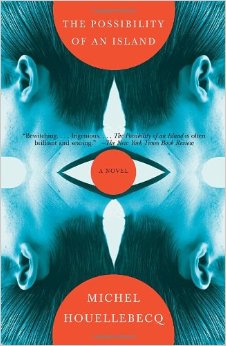 While on tour promoting Imperial Bedrooms, Bret Easton Ellis was pimping out Michel Houellebecq and his novel The Possibility of an Island. It makes sense, as Houellebecq and Ellis share many sensibilities and opinions: an aggressively white male point of view, a biting sense of humor, a predilection toward using shock value, confusion of sexuality and vitality, and a rather dim view of society if not humanity. There are two sharp divides between Houellebecq and Ellis, stemming from the same problem: Houellebecq directs his digust at the world having little personal insight into his own behavior, while Ellis is completely interior and recognizes (even as he indulges in) his own foibles.
While on tour promoting Imperial Bedrooms, Bret Easton Ellis was pimping out Michel Houellebecq and his novel The Possibility of an Island. It makes sense, as Houellebecq and Ellis share many sensibilities and opinions: an aggressively white male point of view, a biting sense of humor, a predilection toward using shock value, confusion of sexuality and vitality, and a rather dim view of society if not humanity. There are two sharp divides between Houellebecq and Ellis, stemming from the same problem: Houellebecq directs his digust at the world having little personal insight into his own behavior, while Ellis is completely interior and recognizes (even as he indulges in) his own foibles.
Houellebecq’s 2005 novel The Possibility of an Island follows two timelines in parallel. Daniel 1 is a successful and extremely rich comedian living in the present time. Toward the end of his life, becoming depressed by his hedonist lifestyle and the lack of intimacy it provides, Daniel 1 finds a new religion based in a very male fantasy ideal of feminism. That religion worships technology, and believes that it can provide eternal life through the use of cloning.
The second timeline is that of Daniel’s far-future clones Daniel 24 and 25. Because of their religion, they have to read the original Daniel’s life and how he was key to the development of the religion. These latter Daniels live in a post-apocalyptic society ravaged by nuclear war and climate change, where roving bands of primal tribes of post-humans (and natural humans) struggle for their own survivor. Because of the money involved in the religion (and Daniel 1’s own economic success), the clones live in a glass house far above the hunter gatherers.
For Daniel 1’s world, Houellebecq pulls in threads from all over society. The religion Daniel 1 joins has the feeling of Raëlism, which believes that UFOs founded human life, and that all other religions are based on alien visitors who claimed to be Buddha/angels/God/Jesus/Mohammad. They also contain a sensuality/sexuality-first believe system that encourages a woman’s choice in sexual partners. Houellebecq also snags Boomer-level hippy-esque Hedonism, racism and sexism. It’s a strange amalgam that informs how the wealthy white world has warped itself into twisted pretzels trying to figure out or validate their life purpose and desire.
Cynicism and irony rule most of Houellebecq’s books. Much like Bret Easton Ellis, Houellebecq uses irony or faux irony to mask over his own pain and sour outlook on the world. From one viewpoint, The Possibility of an Island is a hilarious black comedy about how human narcissism will result in the end of the world. From another, it’s a racist sexist screed against all humanity including Houellebecq himself. Through his purposeful absurdism, Houellebecq manages to be enraging, sarcastic, nihilistic, existential, and dumbfounding (often on the same page).
Though Houellebecq adapted the novel into a poorly-received movie (still not available on DVD in the U.S.), the closest to an adaptation is Don Hertzfeld’s World of Tomorrow, which is more of an anti-adaptation. In World of Tomorrow, a very young child named Emily is visited by her third generation clone, Emily 3. Emily Prime is taken on a tour of Emily’s 3’s life, including Emily 3’s desperate search for happiness through work and love. Where Houellebecq is a cynic that finds the progress of life to lead to Hell, Hertzfeld ultimately believes in embracing life in all its pleasurable variations. “Live well and live broadly” is Hertzfeld’s thesis, and Houellebecq’s antithesis. Seeing World of Tomorrow in relation to The Possibility of an Island is a fascinating exercise in intent and purpose, more than it might seem at first blush.

